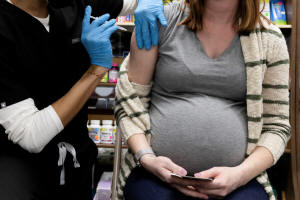Vaccinated pregnant women pass protective antibodies to babies
 Send a link to a friend
Send a link to a friend
 [September 25, 2021]
By Nancy Lapid [September 25, 2021]
By Nancy Lapid
(Reuters) - The following is a summary of
some recent studies on COVID-19. They include research that warrants
further study to corroborate the findings and that have yet to be
certified by peer review.
Vaccinated pregnant women pass antibodies to babies
Pregnant women who get an mRNA vaccine against COVID-19 pass high levels
of protective antibodies on to their babies, new research shows. Doctors
analyzed umbilical cord blood from 36 newborns whose mothers had
received at least one dose of an mRNA vaccine from Pfizer/BioNTech or
Moderna. All 36 babies had high levels of antibodies that target the
spike protein on the surface of the virus - and all of the antibodies
could be traced to the mothers' vaccinations. The findings, reported on
Wednesday in the American Journal of Obstetrics and Gynecology -
Maternal Fetal Medicine, indicate that "the antibodies that the mother
is building to the vaccine are crossing the placenta and that's likely
to confer benefits for the infant after it's born," said coauthor Dr.
Ashley Roman of NYU Langone Health in New York City. It is not clear
whether the timing of vaccination during pregnancy is related to
antibody levels in the baby. And, "we don't know how long those
antibodies stick around in the baby," Roman said. "But the presence of
these antibodies in the cord blood, which is the fetus' blood, indicates
that the baby also has potential to derive benefit from maternal
vaccination."

Scientists map antibody binding sites on virus spike
A new COVID-19 "antibody map" is helping researchers identify antibodies
that will be able to neutralize the coronavirus even after it mutates,
according to a report published on Thursday in Science. Using hundreds
of antibodies collected from COVID-19 survivors around the world, a
global research team mapped out exactly where each antibody attaches to
the spike protein on the virus surface, which it uses to break into
cells and infect them. The researchers looked for - and found -
antibodies that target sites on the spike that are so important for the
viral life cycle that the virus probably could not function without
them. Those sites are likely to remain targets for vaccines or
treatments even when the virus mutates.
"If you are making an antibody
cocktail, you'd want at least one of those antibodies in there because
they are probably going to maintain their efficacy against most
variants," said coauthor Kathryn Hastie of the La Jolla Institute for
Immunology in California, in a news release.
[to top of second column]
|

A pregnant woman receives a vaccine for the coronavirus disease
(COVID-19) at Skippack Pharmacy in Schwenksville, Pennsylvania,
U.S., February 11, 2021. REUTERS/Hannah Beier

Her team, known as the Coronavirus Immunotherapeutic Consortium, has made the map and a
color-coded library of antibodies available in public databases so other
scientists can access the data.
J&J vaccine efficacy holds steady, increases with booster
A U.S. study comparing nearly 400,000 people who got the one-shot
COVID-19 vaccine from Johnson & Johnson with 1.52 million people of
similar ages, genders and health issues who were unvaccinated showed it
was 79% effective at preventing confirmed coronavirus infections and 81%
effective at preventing COVID-19 hospitalizations, J&J said in a report
posted on medRxiv ahead of peer review. There was no evidence of reduced
effectiveness over the study's duration from March to late July - a
period that included the rise of the highly contagious Delta variant,
the company said. Preliminary data from a separate study suggest a
second booster dose given about two months after the first shot
increased the vaccine's efficacy to 94% in the United States against
moderate-to-severe forms of COVID-19. The company announced those latest
findings on Tuesday, when half the people in the study had received the
second shot at least 36 days prior. Side effects of the second dose were
comparable to those seen in studies of the first shot. The data will be
submitted for publication in the coming months, J&J said.
(Reporting by Nancy Lapid, Megan Brooks and Julie Steenhuysen; Editing
by Bill Berkrot
[© 2021 Thomson Reuters. All rights
reserved.] Copyright 2021 Reuters. All rights reserved. This material may not be published,
broadcast, rewritten or redistributed.
Thompson Reuters is solely responsible for this content.
 |